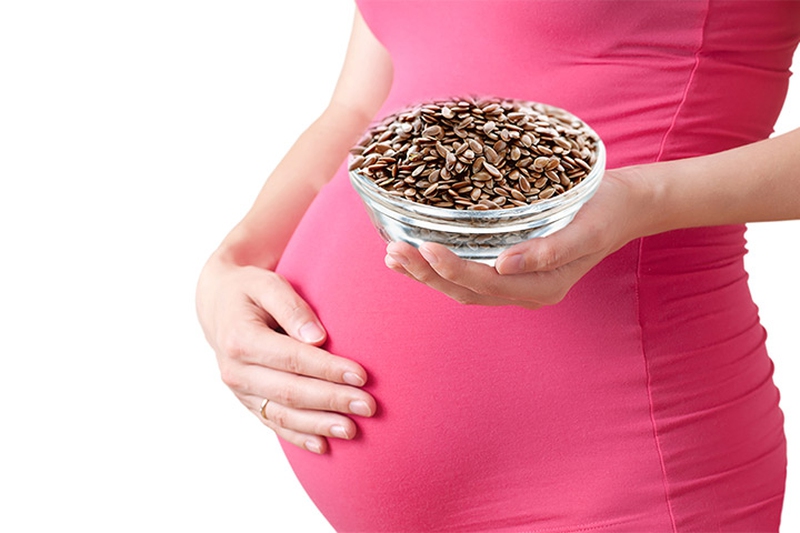When you are expecting a small bundle of joy it is common to consider, or even worry about foods that may benefit or possibly damage the healthy development of your child. Such thoughts may be directed towards flax seeds when pregnant. Are they good for you and your child? Are there any risks associated with their consumption? Continue reading to ascertain answers to these questions and more information regarding food safety during pregnancy.

Is It Ok to Eat Flax Seeds During Pregnancy?
There are many nutritional benefits that come with the consumption of flax seeds. These nutritious seeds are packed full of fiber and omega-3 fatty acids, which are beneficial to health at all times but especially so during pregnancy. Flax seeds also contain potassium, magnesium, calcium, iron and vitamin B6. When consumed, they can work to lower cholesterol, control blood sugar and ease any bouts of constipation, all of which is extremely useful for the health of expecting mothers, as well as the health of their unborn child. The health benefits of flax seeds seam to be endless, especially when you consider their anti-cancer, anti-diabetes and anti-cardiovascular disease properties, but some believe that there may be negative connotations related to their consumption during pregnancy.
Concerns in Early Pregnancy
There is evidence that shows flax seeds act as estrogen, which means that is can actually stimulate menstruation and contractions. For this reason, it is usually suggested that you avoid the consumption of flax seeds during pregnancy, especially in the early stages. That being said, there are many women who consumed flax seeds throughout pregnancy without experiencing any adverse side-effects and who went on to give birth to healthy and happy babies.
Generally speaking, there is very little evidence that states flax seeds are bad for you during pregnancy. Some experiments have shown that in high dosages it may have an adverse effect on a fetus (when testing on animals). No such conclusions have been deducted from human testing so the true effect remains unknown, although there have been few if any flax seed related complications to a woman's pregnancy. It is generally safe if consumed in small amounts.
Tips for Healthy Intake
If you feel that you want to consume flax seeds during your pregnancy for all of the healthy benefits associated with their consumption, then it would be most advisable to first seek the advice of your midwife to best ascertain whether it is a good idea. It should also be noted that flax seeds, like many other seeds and nuts, contain a small amount of cyanide. Whilst eating them raw will rarely result in complications arising (such as a rise in blood cyanide levels or immediate breathing difficulties), some suggest baking flax seeds before consumption to eradicate the cyanide properties within them. Whilst there are some seeds that contain dangerous levels of cyanide, flax seeds do not, though you may wish to bake them before consumption if you want to be extra safe.
More Precautions to Bear in Mind
If you choose to eat flax seeds during pregnancy, then you should note that there may be some adverse side effects. These include:
Diarrhea
Increased blood pressure (when eaten raw)
An allergic reaction to the seeds
Nausea
If you notice any of these adverse side effects, then consult your healthcare professional as soon as possible.
When including flax seeds in your diet during pregnancy, as long as you practice moderation and only consume around one tablespoon a day you should reap all of the rewards and avoid all negative connotations.
If you are planning on breastfeeding your child, then you should be aware of the fact that the effect of flax seed consumption on breastfeeding and healthy milk production is unknown. This is why it is important to speak with your midwife prior to consuming flax seeds if you are planning on breastfeeding your child when they arrive.
Foods You Should Avoid During Pregnancy
During the months of pregnancy, a woman's immune system experiences a reduction in it’s ability to fight off bacteria and infection. This means that pregnant women may be more susceptible to foodborne illnesses, which can have an adverse effect on pregnancy and possibly lead to a premature birth or miscarriage. For this reason, practicing proper food safety during this time is critical. By reading about the consumption of flax seeds during pregnancy you are on the right track, but there is much more to consider in regards to food safety to ensure that you encounter no unwanted occurrences during your pregnancy, and you give birth to a healthy and happy child. You should speak with your healthcare professional to best understand what to avoid eating whilst pregnant, though generally speaking, the following should be avoided:
Unpasteurized milk (or cheese made from unpasteurized milk)
Soft cheese
Raw seafood
Unpasteurized juice
Undercooked meats
Raw eggs
Raw sprouts
View All Comments /Add Comment